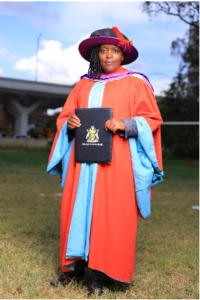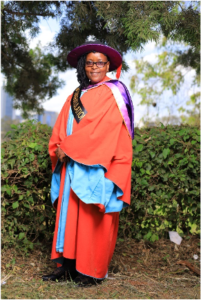Dr. Susan Kung’u is a lecturer in Communication, Media and Gender Studies at the Presbyterian University of East Africa. She holds a Ph.D. in Communication and Information Studies from the University of Nairobi, a Master’s degree from the same university, and a Bachelors in Education degree from Kenyatta University, Kenya. Her doctoral dissertation studied the construction and representation of social reality, particularly regarding gendered violence in soap operas.
Susan is a 2020 Next Gen Doctoral Dissertation Research fellow and a 2022 Next Gen Doctoral Dissertation Completion fellow. She is also a recipient of the 2022 British Institute in East Africa (BIEA) thematic grant. Her professional engagement extends beyond the classroom; she is an author, reviser, and editor of primary and secondary school English textbooks and e-books. She is a member of the Local Organizing Committee for the Social Science Research Council’s APN and Next Gen African University Seminar Series, Kenya (AUSS-K), and a member of the International Studies Association (ISA). She is also a co-founding member of PADRA (Peace and Development Researchers’ Association). Her research interests focus on the intersections of media, culture, and gender dynamics. Her interdisciplinary approach examines how media, technology, and societal structures shape gender-based violence. She is committed to promoting inclusivity and gender equality and envisions a society free from gender-based violence in both physical and digital spaces.
Next Gen: Briefly describe the central argument of your doctoral dissertation. What is its main contribution to knowledge in your field?
Dr. Susan Kung’u: My doctoral dissertation investigated the construction and portrayal of gender-based violence (GBV) in two selected Kenyan soap operas, Mother-in-law and Makutano Junction. The central argument was that portrayals in soap narratives significantly shape audience perceptions of gender dynamics and societal norms surrounding gendered violence.

These portrayals, through a gynocentric and sometimes misandrist lens, validate violence by entrenching stereotypes, excluding justifications for it, as well as consequences for perpetrators and victims. This study thus contributes to theoretical frameworks on media effects, highlighting the need for practical interventions addressing GBV in media and the broader society. It lays the groundwork for further research into prosocial portrayals of gender dynamics. It also supports the gender mainstreaming of soap operas to challenge antisocial attitudes toward GBV. By uncovering these dynamics, the study seeks to promote content that strengthens inclusivity and positive cultural narratives in Kenyan society.
How did the Next Gen fellowship program impact your doctoral journey?
The Next Gen fellowship program significantly impacted my doctoral journey, especially because I received both the Next Gen Doctoral Research and Next Gen Doctoral Completion fellowship awards.
- Financial Support
These Next Gen fellowship awards provided critical support by covering the costs for additional research, specialized equipment, internet bundles, travel expenses, and stationery, as well as other miscellaneous expenses during research, analysis, and the writing of my doctoral dissertation. Additionally, I was able to pay my tuition fees using the grants. This financial relief reduced my stress and minimized external commitments. The support enabled me to fully focus on my doctoral journey in a more conducive environment.
- Time for Research and Writing
The fellowship also afforded me the opportunity to reduce my work hours. It gave me the time needed to devote to writing, revising and completing my dissertation. This extended period of concentrated effort allowed me to go deeper into my research, conduct thorough analyses, and produce a high-quality doctoral dissertation. By minimizing distractions through financial support, I was able to maximize my research output and progress efficiently.
- Training and Mentorship
The fellowship provided invaluable training opportunities. I attended several conferences and seminars where I engaged with scholars in my field, particularly through the mentorship programs offered by SSRC. These mentors, with expertise in research methodology, media, Afrocentric theories, and philosophy, have greatly enhanced my academic, research, and writing skills, deepened my understanding of African decoloniality, and greatly contributed to better preparedness for my final dissertation defense.
- Networking, Collaboration, and Publishing
Another major benefit has been the networking opportunities. I connected with like-minded African scholars who encouraged me and made me more focused on the doctoral journey. I was also able to organize local seminars and author a book chapter from a paper I presented at one of them. The book chapter is currently under revision as a contribution to an edited volume. The exposure I gained from workshops also enabled me to publish two peer-reviewed articles in credible peer-reviewed journals. Additionally, I was able to publish two papers in Kujenga Amani by SSRC. These achievements have significantly bolstered my academic and professional profile.
- Facilitating Professional Development and Travel Opportunities
The fellowships also facilitated my participation in key professional development activities. I attended conferences, workshops, and seminars relevant to my research. This allowed me to network, present my research findings, and receive valuable feedback from peers and experts. These included participation in a virtual workshop due to COVID-19 pandemic, and another in Morocco in 2022. The knowledge, exposure, and connections I gained through these workshops were impactful, extending beyond the scope of dissertation writing.
Now that you have completed your PhD, what are your plans for the future?
My immediate plan is to pursue a postdoctoral position to enhance my research skills through interdisciplinary research. I envision advancing research in communication to empower local communities through accessible information, promote inclusive media representation, and support regional goals for social development and innovation.
What advice do you have for upcoming doctoral students?

For upcoming doctoral students, especially those pursuing research in Africa, my advice is to stay curious and keep an open mind. There will be challenges but they should always try to view setbacks as part of the learning process. There are times when the academic journey may feel like an endless challenge. No matter how discouraged you feel, don’t give up. Seek like-minded scholars and exchange notes. Beware of bureaucratic processes that may derail you. Seek fellowships: they reduce your financial constraints keep you focused, and connect you with mentors and like-minded scholars. They also expose you to the global standards, best practices, and the rigors of high-quality dissertation writing. For those in the Social Sciences, I’d advise you to try the Africa Peace Network or the Next Generation Social Sciences in Africa. Both are programmes by the Social Science Research Council.
Aim to steer clear of politics where you can, as it can complicate your work in unexpected ways. And above all, take care of yourself along the way. Balancing your work with things that bring you joy, and rest can make all the difference in staying motivated and purposeful. It is a doable process.
A Selected List of Susan Kungu’s Publications
Susan Kung’u, Sam Kamau, & George Gathigi (2023). Deconstructing gender-based violence from Kenyan soap narratives: Unveiling the nexus between syndemics, women’s health, and transformative change. Pathways to African Feminism and Development, Journal of African Women Studies Centre.https://uonjournals.uonbi.ac.ke/ojs/index.php/aws#:~:text=This%20issue%20carries%20a%20selection,sustainable%20development%20across%20various%20sectors.
Susan Kung’u & Sam Kamau (2023). Representations of gender-based violence in Kenyan soaps and their reverberation on audience attitudes, perceptions, and behaviour. Kabarak Journal of Research & Innovation, 13(1), 52–70. https://journals.kabarak.ac.ke/index.php/kjri/article/view/289.
Kung’u, S., & George Gathigi (2023). Gynocentric lenses? Deconstructing gender-based violence in the Kenyan soap opera. Kujenga Amani, Social Science Research Council. https://kujenga-amani.ssrc.org/2023/04/07/gynocentric-lenses-deconstructing-gender-based-violence-from-kenyan-soap-operas/.
Kung’u, S. (2024). Traversing horizons: Reflections on the Global South Conference held in Bangkok, Thailand. Kujenga Amani, Social Science Research Council. https://kujenga-amani.ssrc.org/2024/06/05/traversing-horizons-reflections-on-the-global-south-conference-in-bangkok-thailand/.
Self-published e-book
eCash Made Easy: 100 Streams to Online Wealth. ISBN 978-9914-768-23-7, Copyright No: RZ 64353
Book Chapter accepted for publication
Media Narratives and Peacebuilding Amidst Conflict and GBV in Kenya.

